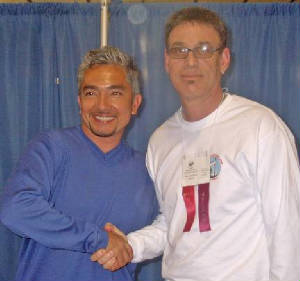Anxiety: Don't Pet It Away
It's hard to see your dog suffering from anxiety, whether at the vet, the groomer or during a thunderstorm. Our natural reaction as human beings is to comfort the dog. The most natural way for us to do this is to pet the dog and offer soothing tones of voice. This, we feel lets the dog know that we care, that we're there to protect him and that no harm will come to him. While this is a perfectly natural human reaction, it may not have the effect on the dog that we think it will.
You must remember that what while dogs seem very similar to us, they are not human, And sometimes dogs respond differently than we will. This is never more important than when dealing with stress. Our natural reaction to comfort the dog by petting him and saying soothing things will often be perceived your dog as encouragement for his fear. Worse yet, he may believe you're afraid too. And if you're afraid, truly something horrible must be happening.
One of the primary principles of conditioning is that behavior which is rewarded is likely to be repeated. So by petting the anxious dog we are making it more likely that he will feel fear in the future. This is quite the opposite of what we really want. What we want is to build the dog's confidence. Petting your dog when he is in a fear state is not likely to accomplish this goal.
So what do we do to help your Chicago dog behavior problem?
The first step is to not reward the fear. However this does not mean we should be insensitive. We have two choices: we can remain neutral, or we can remain jovial. Which path we take depends more on our own personality than the dog's. Whichever path we take it is imperative to avoid looking stressed.
Personally, I prefer the jovial approach. William Campbell, the dog behaviorist, refers to this as the jolly routine. The basic premise is that we act amused by whatever is frightening the dog. That should not be confused with laughing at the dog. We are laughing at that thing that frightens the dog, and the dogs should be encouraged to "laugh" as well. Keeping your attitude lighthearted and jovial will sometimes convince the dog that there is nothing to fear.
The neutral approach can also be quite effective. In this approach, we simply say, in a kind voice, "You're being silly. There's nothing to be afraid of." Then we resume our previous activity. This shows the dog that we are unconcerned by whatever is frightening him. It is even permissible to verbally redirect him when the dog shows undue fear. Redirection should be very gentle and entirely nonthreatening. Anything we do to threaten the dog is likely to make matters worse not better. So great care should be taken in choosing when, and how to use a redirect.
A good example of redirection is to ask your dog to sit or lay down when he shows fear of thunderstorms. Give your dog a job to do, one that you taught him earlier, under easier conditions. Nothing distracts the mind as well as having a productive job to do. By the way, it may work for you too. Next time you're nervous during a turbulent airplane ride, read a book and really focus on the material. Nothing relieves stress like redirecting your thoughts elsewhere.
Another good idea is to offer a high-value food reward any time the dog is in the presence of the thing that frightens him. This is called counter conditioning, and it can be a very effective method for combating fear in dogs. A more advanced version of counter conditioning would require the dog to sit before receiving his food reward. I find it valuable to start with the easy (giving the dog the reward) and then progress to the harder (making the dogs sit to earn the reward).
With a little patience and a little understanding, you will find that most fearful behavior in dogs can be easily solved. However, in extreme cases it is wise to seek the help of a professional Chicago trainer.
Marc Goldberg, CDT is a professional Chicago dog trainer who specializes in anxiety reactions in dogs. He can help restore your dog's natural and balanced way of thinking so you can both be happy.
Our Philosophy & Goals
Our philosophy is simple. Improve the life of both dog and family. All too often, unruly dogs do not fully enjoy life because their families constantly become upset and frustrated with them. This is difficult for both family and dog.
Our mission is simple. Make both dog and family happy.
What does is take to make your dog happy? He will thrive when you give him leadership and attention.

Making the family happy is a bit more complex.
Families typically want their dog to:
- Come when called, every time, on or off leash
- Walk nicely on a loose leash without pulling
- Sit until released
- Down until released
Families also want their dogs:
- Not to jump on people
- Not to charge through doors
- Not to dig in the garden
- Not to bark and chew inappropriately
- Not to climb on furniture you prefer they avoid
- Not to sniff and eat off the table and counters.
- Not to be wild and uncontrollable
- Not to ignore you when you want their attention




